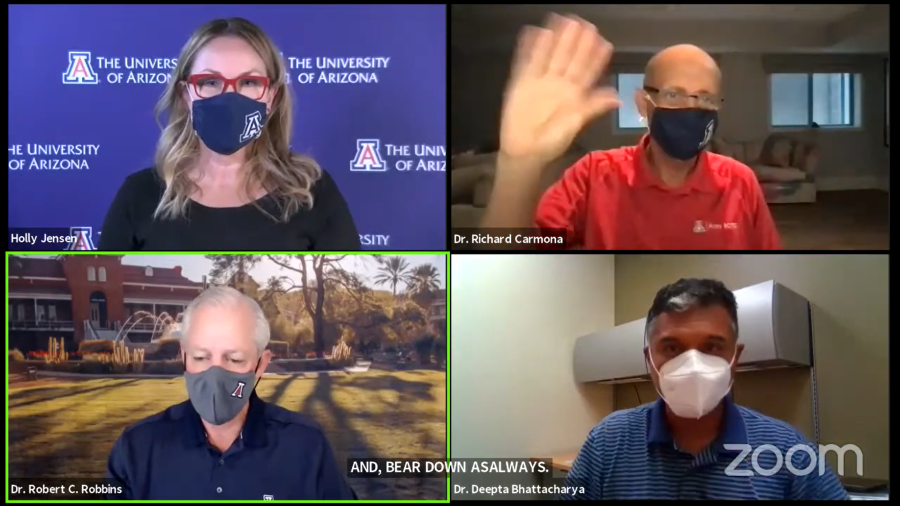The University of Arizona’s virtual university status update team met on Monday, Oct. 18, to discuss COVID-19 public health and safety measures and to encourage the remaining unvaccinated UA students and employees to get inoculated against COVID-19. The team was joined by Deepta Bhattacharya, a professor of immunobiology at the UA.
UA President Dr. Robert C. Robbins opened the meeting by once again encouraging vaccination against COVID-19.
“The vaccines remain our best way out of this pandemic,” Robbins said.
Robbins then reiterated his announcement from Friday, Oct. 15, in which he stated that the UA would comply with President Joe Biden’s Executive Order that requires institutions that contract with the government to comply with guidance from the Safer Federal Workforce Task Force, which issued guidelines for all employees of these institutions to get vaccinated against COVID-19.
All UA employees, including student employees and graduate assistants, must digitally upload proof of vaccination by Dec. 8, unless they have been granted religious or disability accommodation.
Robbins reiterated that Pfizer COVID-19 booster shots for UA students, faculty and staff are available through Campus Health.
Rapid antigen testing is available to all students, faculty and designated campus associates. These tests are nasal swab tests and typically have results available within two hours of sample collection.
Robbins then handed the floor to Dr. Richard Carmona, 17th Surgeon General of the United States and a distinguished professor at the UA, to discuss case rates and the public health situation at the university.
“It’s almost gonna be coming up on two years now, as we get through the holidays,” Carmona said.
Carmona emphasized that COVID-19 cases are low in Pima County.
“Now, that’s no reason to become complacent. We’re still in a high transmissibility area,” Carmona said.
Carmona then reported vaccination rates in Pima County, with a total of 67% of eligible Pima County residents having received at least one dose of a COVID-19 vaccine.
Carmona also expressed concern about state vaccination rates, with only 58.3% of eligible Arizona residents having received at least one dose of a COVID-19 vaccine.
“It’s a high number, but still, what it’s telling you is is that almost half [of] the state is still not fully vaccinated, and that is a problem,” Carmona said. “What that means is there are still people out there that can become infected, that can become vectors, that can spread the infection themselves.”
Carmona closed by emphasizing the ability of health and wellness, and promoting the availability of Counseling and Psych Services and Life and Work Connections as important resources after almost two years of the pandemic.
Bhattacharya then took the floor to discuss the COVID-19 vaccine. He began by discussing COVID-19 vaccine trials, stating that they focused on whether the vaccine prevents you from getting sick and if there were any adverse side effects of the vaccine.
Bhattacharya emphasized that original trials demonstrated that both the Pfizer and Moderna COVID-19 vaccines had 95% efficacy in preventing COVID-19.
“That means, if you get one of those vaccines, it means that you’re about 20 times less likely than an unvaccinated person to get sick,” Bhattacharya said.
Bhattacharya stressed that the adverse effects of the vaccine are minimal, with soreness around the arm and not feeling well after the second injection.
Bhattacharya then emphasized that the higher transmissibility of the Delta variant posed some challenges.
“Eventually, the virus will get you if you’re not vaccinated,” Bhattacharya said.
Bhattacharya stressed the importance of vaccination, which rarely has any side effects, as a much better solution than the alternative, potentially getting COVID-19, which he emphasized kills about one in every hundred people who contract it.
Bhattacharya closed by encouraging individuals in the appropriate, Food and Drug Administration-approved demographics to receive booster shots for COVID-19.
The meeting then went to open discussion, in which Robbins, Carmona and Bhattacharya all once again stressed the importance of vaccination.
Carmona expressed concern about the divisiveness surrounding the COVID-19 vaccination, when in the past, parents had to have their children inoculated against many diseases to send their kids to school.
“You don’t see polio anymore because of [Albert] Sabin and [Jonas] Salk’s work,” Carmona said. “Vaccination may arguably be the most beneficial scientific advancement in mankind, and yet we still have problems with accepting that.”
The briefing then moved to a Q&A portion, during which Robbins stressed the importance of continuing UA research by mandating vaccination for UA employees, which, in addition to being required under Biden’s executive order, was a condition of contracts and grants received by the UA. Robbins also stated that there would not be a vaccine mandate for UA students, with the exception of student workers.
Follow Sean Meixner on Twitter








